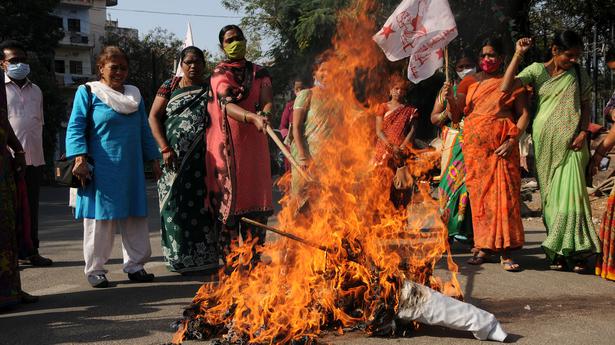
Delhi court dismisses bail application of accused in Kasturba Nagar gang-rape case
The Hindu
The judge noted that it was a “very serious case,” where the lady was assaulted, sexually abused and molested.
A Delhi court has dismissed the bail application of an accused in a case where a 20-year-old woman was allegedly abducted, gang-raped, and paraded by a group of people in Kasturba Nagar in January, terming the offence as “serious and heinous”.
The victim was allegedly abducted and taken to a house, where she was assaulted, sexually abused, and molested on January 26, 2022 and the accused remained outside the house to prevent anyone from rescuing the victim.
“Considering the nature of the case, the gravity of the offence and the allegations against the accused and in the overall facts and circumstances of the case, I do not deem it a fit case to grant bail to the applicant,” Additional sessions Judge Amitabh Rawat said in his recent order.
The judge noted that it was a “very serious case,” where the lady was assaulted, sexually abused and molested.
“The hair of the prosecutrix was shaved, her face was blackened, she was garlanded with slippers and shoes and paraded her in the locality… This was all done to punish her. There are video clips to show various other accused persons. The offence involved is serious and heinous,” the judge said.
The judge further said, “the contention that the name of the accused is not mentioned in the FIR is not relevant as FIR is not an encyclopaedia of the events but the starting point of the investigation of the offence.”

Prodancy Pvt Ltd, a medtech startup specialising in surgical consumables for joint replacement surgeries, has successfully raised ₹2.14 crore in a funding round co-led by Campus Angels Network and Keiretsu Forum Chennai, which also saw participation from existing investors Center for Cellular & Molecular Platforms (C-CAMP) and other angel investors.

“Writing, in general, is a very solitary process,” says Yauvanika Chopra, Associate Director at The New India Foundation (NIF), which, earlier this year, announced the 12th edition of its NIF Book Fellowships for research and scholarship about Indian history after Independence. While authors, in general, are built for it, it can still get very lonely, says Chopra, pointing out that the fellowship’s community support is as valuable as the monetary benefits it offers. “There is a solid community of NIF fellows, trustees, language experts, jury members, all of whom are incredibly competent,” she says. “They really help make authors feel supported from manuscript to publication, so you never feel like you’re struggling through isolation.”









